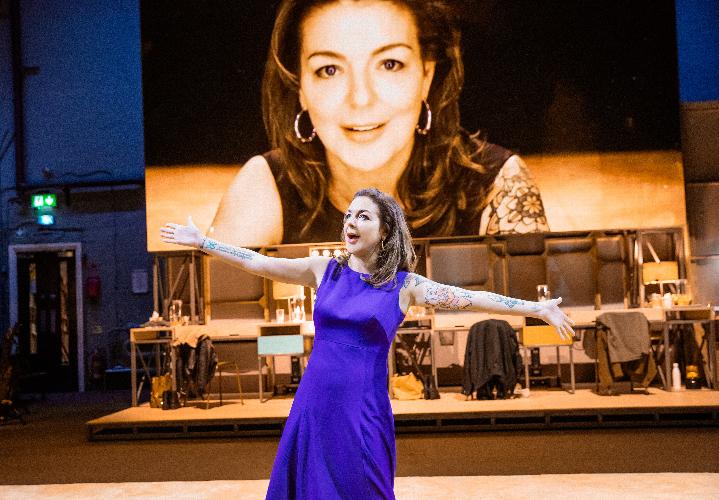“The Second Woman”, a new Broadway show written by Sarah Goode, is opening in a few days. There's excitement in the air. Expectations are high. A documentary crew is filming the creation of what everyone hopes will be a smashing success. Yet, something is off. Myrtle Gordon, the leading lady, is losing the plot. She can't connect with her character, Virginia, too old and passive; she finds acting with her ex-husband Maurice every night very triggering; and lastly, she witnesses the tragic death of Nancy, a seventeen-year-old fan, hit by a car right outside the theatre. “You've got to make magic out of tragic”, she sings to the audience in her first solo, as she tries to muster the courage to go on stage. But she keeps sinking into a self-destructive spiral.
Sheridan Smith gives her all playing Myrtle. She's not afraid to fully embody the mess that her character is in, her inner struggle, her intense emotional turmoil. She is the show. Yet, after over two hours spent with Myrtle, I found it very hard to fully grasp her essence. Her demons are evident: she's reeling from the recent end of a relationship; she fears that, after this production, she will forever be typecast in older, lifeless female roles. She desperately wants to understand Virginia, yet she runs off stage whenever things get too real. She's scared of ageing. She's terrified of doing so in front of an audience. “I will lose their love”, she thinks. “I must stay young”. But who is Myrtle? What drive lies underneath her traumas? Who is this vibrant younger self she can't let go of? What did go wrong with Maurice?
Van Hove's book seems more interested in portraying Myrtle's chaos to such an extent that by the end she risks coming across as unlikeable and selfish. We learn so little about the plot of Sarah's play that it's hard to tell what's real and what's scripted. It's fascinating but it also prevented me from fully appreciating Myrtle's resolution in the final scene. Rufus Wainwright's score is sophisticated (“Trojan Women”); instead of hiding his voice to write traditional show tunes, he brings his distinctive songwriting to the production. Similarly to Anaïs Mitchell with “Hadestown”, he contributes to the redefinition of the musical theatre canon Soulful melodies are played with a fairly minimalistic orchestration. There's a poetic and powerful storytelling in the lyrics; at times they echo Sondheim's masterful writing, especially when matched with more unfamiliar chords and spoken rhythm (“Makes One Wonder”).
This isn't a traditional West End musical. It definitely doesn't fit in a box. Van Hove is well known for redefining genres and pushing the boundaries of conventional storytelling. Here, with set, lighting, and video design by his longtime collaborator Jan Versweyveld, he creates a rehearsal room/stage that both feels larger than life and claustrophobic, like theatre. The boundary between creative and personal life is very thin. Just like the red curtain at the top of the show. You're stepping into a magical and exhausting world. Through his signature big screen, we see the actors up close and follow the action happening off-stage. There's nowhere to hide. At times it's effective (“Life is Thin”), in other occasions can be slightly distracting, splitting the audience's attention in two (“Magic”). His direction is excellent and, if you're familiar with his work, you‘ll notice the use of all the characteristic staging choices that made him one of the most inventive directors of contemporary theatre.
This production has a fairly big and very talented cast but unfortunately, the script pays very little attention to most of the characters. I'd have liked to see more of Amy Lennox's Dorothy and her relationship with Hadley Fraser's Manny. I wanted to know Sarah's (Nicola Hughes) and Maurice's (Benjamin Walker) backstories. Just like with massively codependent families, I felt that most of the characters' journeys were sucked into Myrtle's spiralling drama. Shira Haas stands out as Nancy, playing a rather cryptic role with a mischievous energy and a vulnerable heart.
“We're lucky people” - says the director Manny at one point - “we get to do a job we love!”. It's the reason why creatives do what they do. They share themselves through their writing, acting, creating. They feel alive. But when your passion becomes your work, the personal can easily bleed into the professional. “Opening Night” fully exposes the chaotic consequences of this blurring of the lines and the domino effect one's drama has on the rest of the team. The show must go on. It's exciting. It's madness. It's live theatre.
It runs until 27 July. Tickets: here.
Review: Francesco Pagnoncelli Photo: Jan Versweyveld

